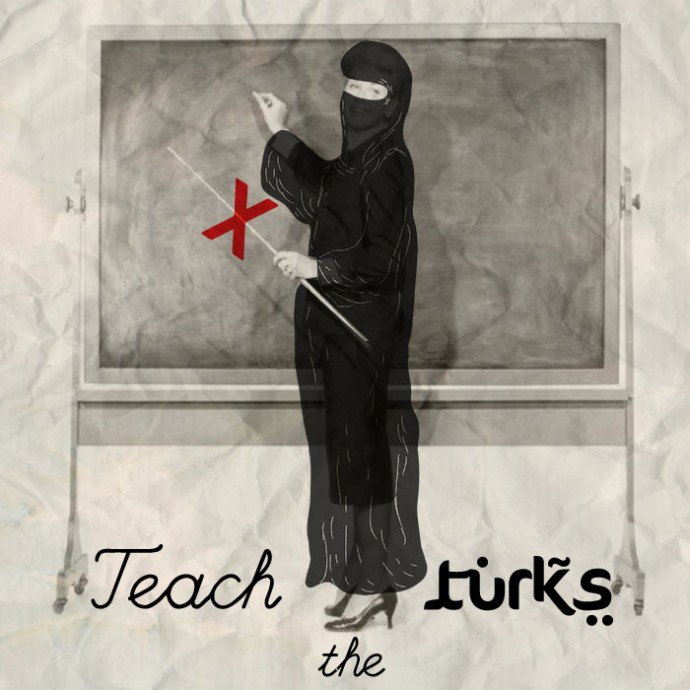There are around 4 million people of Turkish descent currently living in Germany, mostly attracted during the 1960s-‘90s by government ‘Gastarbeiter’ schemes. This has made Berlin home to the largest Turkish community outside of Turkey itself. Yet with 61% qualified at only a primary school level, Turks are the lowest-educated ethnic minority in Germany. Frustrated by the strain of overcoming cultural barriers with ineffective official support, one Berlin-based female teacher is speaking out.
I used to love teaching my Turkish students. Considering that (whatever the official statistics may claim) 95% of the pupils taught at my South-Berlin high school come from Turkish and Middle Eastern backgrounds, this was no bad thing. These children, the sons and grandsons, daughters and granddaughters, cousins and nieces and nephews of immigrants, have filled my classrooms throughout my entire decade-long teaching career. I am better off for it; they are open, enthusiastic, and cheerful; demanding but responsive, exasperating but aspiring, different in a way that only those straddling two conflicting cultures can be. As an added bonus, I can also now swear fluently and profusely in a range of exotic languages.
Why then, are these same students the reason I find myself dreading work when I wake up in the morning, and leave me curled up and shaking, when I come home at night? That teachers sometimes have problems with students is hardly news, but these troubles are usually left behind when you step beyond the school gates after work. The answer is simple: I am a woman. Whilst traditional gender roles have changed in the West, no such revolution has swept through Turkish culture, and as a result, at least one third of my students are being raised in strictly traditional homes and have had the idea deeply ingrained into their young minds that women have nothing to say, must be obedient, selfless, and utterly servile; that men must be alpha males, loud and controlling, demanding and spoilt. All too often this is reinforced with violence; domestic abuse, rape, and exploitation of women are seen as the fault of the woman, as no issue at all, or worse, and most commonly amongst the younger males, as a casual thing. Western Societies concern over gender equality and abuse is a source of mild amusement.
The girls raised in such households are easy to identify; they are the ones that sit quietly, wearing headscarves. I pity them. I pity them, because unlike their mothers, who knew nothing else but the insular bubble of their native culture, these girls are exposed to the daring idea that women are of equal value to men, and should they choose to embrace this idea, they will be cast out from their family. Their choice is stark; a life of servile drudgery or the loss of their entire family and heritage. There is little I can do to help, but heartbreaking as their plight is, it is not the girls with whom I’ve become disillusioned; for young boys of sixteen, swaggering and macho behaviour is to be expected, but for them to be disrespectful, abusive, and threatening is not. Parents, as often as not, will support this behaviour upon learning that a female teacher has had the audacity to try discipline their son – the clan will rally around and turn an immature threat into a worrying possibility of action. When I began teaching, the headmaster warned me that I might face problems due to my gender, and offered his full support. Having attempted repeatedly to take up his offer and been rebuffed, my eyes were forced open to the fact that, in the face of harassment and intimidation, the female teacher is very much on her own.
Mine is not an isolated case, and despite the cheap political capital that too many are keen to manipulate, it’s not a racial problem or the result of too much immigration. First-generation immigrants are no more likely than the second- or third- generation to behave this way. Nor is it to do with social class, or poverty or wealth. It is a minority of families who deliberately refuse to integrate into the Western society which has welcomed them. In this micro-society, the West and its ways are scorned and those incompatible aspects of Turkish culture upheld, far beyond the limits of simply preserving heritage. These are the groups of men who loiter menacingly at the school gates, the relatives who harangue teachers in groups of four or five and who have made me feel afraid for the first time in the career that I love. And what bothers me the most, is that only when I push past them at the gates and break free of that small district of Ankara, seemingly supplanted into Berlin, do I finally remember that this isn’t how things should be.







